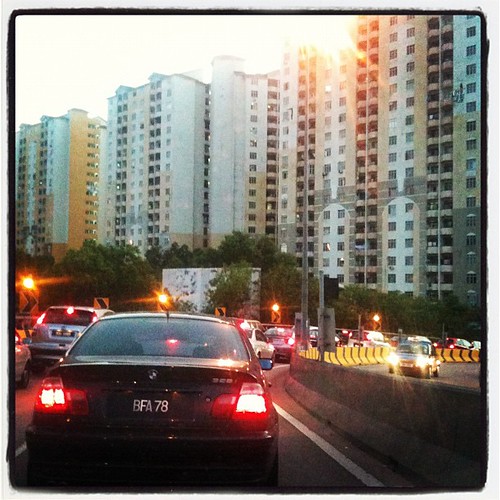Ownership of cars and motorcycles in the state of Penang, Malaysia, is increasing at average rates of 9.5 per cent and 7.2 per cent a year, respectively. The total number of private vehicles registered in the state doubled between 1985 and 1995.
This has resulted in urban traffic congestion, with increased delays and travel times, higher rates of injury and death from traffic accidents, as well as environmental degradation.
While the rapid increase in vehicular traffic is usually attributed to economic growth and urbanization, in this case it is because current transportation policy and investment in transportation projects are disproportionately skewed towards meeting unabated demand for road space. The needs and concerns of pedestrians, cyclists and bus users are seldom, if at all, taken into consideration in national and state transportation policies and plans.
The transportation requirements of mobility-impaired and vulnerable groups such as people with disabilities and the elderly, as well as vulnerable groups such as children and the poor, are almost always neglected when transportation planning is undertaken and investments are made.
Sustainable Transport Environment in Penang (STEP) was established in 1998 by a group of concerned citizens and voluntary groups in Penang, with the primary aim of addressing the concerns and advocating the interests of pedestrians, cyclists, public transport users and mobility-impaired groups.
This has resulted in urban traffic congestion, with increased delays and travel times, higher rates of injury and death from traffic accidents, as well as environmental degradation.
While the rapid increase in vehicular traffic is usually attributed to economic growth and urbanization, in this case it is because current transportation policy and investment in transportation projects are disproportionately skewed towards meeting unabated demand for road space. The needs and concerns of pedestrians, cyclists and bus users are seldom, if at all, taken into consideration in national and state transportation policies and plans.
The transportation requirements of mobility-impaired and vulnerable groups such as people with disabilities and the elderly, as well as vulnerable groups such as children and the poor, are almost always neglected when transportation planning is undertaken and investments are made.
Sustainable Transport Environment in Penang (STEP) was established in 1998 by a group of concerned citizens and voluntary groups in Penang, with the primary aim of addressing the concerns and advocating the interests of pedestrians, cyclists, public transport users and mobility-impaired groups.
This paper provides a brief discussion of the transportation issues in Penang and highlights concerns such as the environmental impact of road traffic, with emphasis on vehicular traffic-generated noise and air pollution.
The paper then proceeds to describe the formation and the various initiatives of STEP, following its participation in the Sustainable Penang Initiative (SPI). Successful lobbying initiatives, such as improvements to a major bus terminal in Georgetown, Penang, and the efforts of the group known as Sustainability, Independence, Livelihood, Access (SILA) are also mentioned.
The paper also discusses the advocacy experience of STEP and the issues for the future.
The paper then proceeds to describe the formation and the various initiatives of STEP, following its participation in the Sustainable Penang Initiative (SPI). Successful lobbying initiatives, such as improvements to a major bus terminal in Georgetown, Penang, and the efforts of the group known as Sustainability, Independence, Livelihood, Access (SILA) are also mentioned.
The paper also discusses the advocacy experience of STEP and the issues for the future.
more about urban Malaysia:

No comments:
Post a Comment